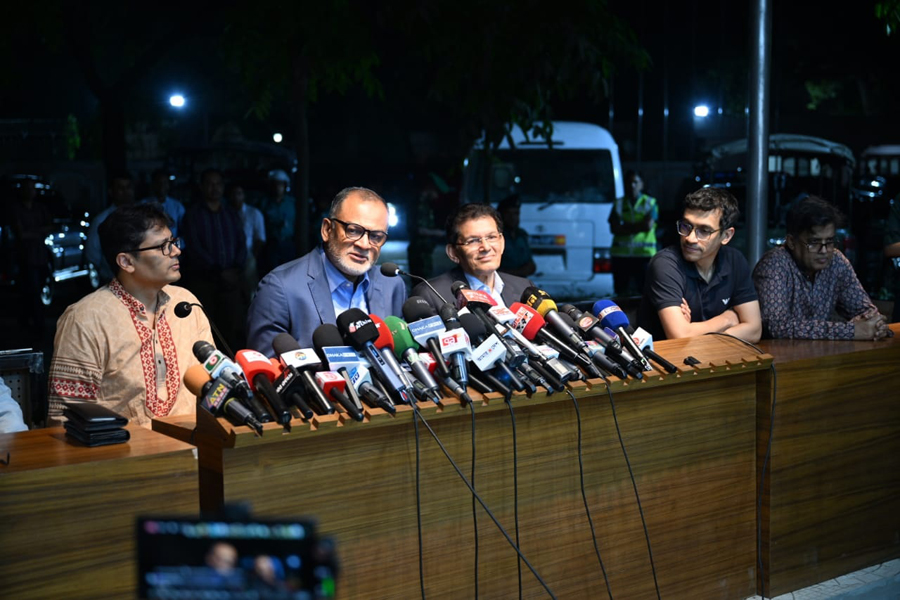
Published :
Updated :

Chief Adviser's High Representative Dr Khalilur Rahman on Saturday night said Bangladesh would soon take some measures in consultation with the US administration regarding the tariff issue, stressing that there is nothing to panic about.
"We are prepared for this. We will soon take some measures. These measures will be taken in consultation with the US administration. There is nothing to fear or get panicked. We are fully prepared," he said.
The High Representative was talking to reporters at a media briefing after the emergency meeting convened by Chief Adviser Prof Muhammad Yunus at State Guest House Jamuna to discuss the US tariff issue.
Commerce Adviser Sk Bashir Uddin, Chief Adviser's Special Envoy Lutfey Siddiqi, BIDA Executive Chairman Chowdhury Ashik Mahmud Bin Harun and Chief Adviser's Press Secretary Shafiqul Alam were, among others, present at the briefing.
The High Representative said the issue is not something came up suddenly for them as the Chief Adviser instructed them to engage with the US Administration in the beginning of February this year.
Following that instruction, Rahman said, he had meetings with the US officials at the US Department of State and USTR in the second week of February. "Since then we are in continuous discussions."
He hoped that Bangladesh would get a positive response from the US side.
Commerce Adviser Bashir said they are in touch with the Bangladesh Embassy in Washington and the US Embassy in Dhaka.
He said they see both challenges and opportunities, and efforts are there to address the issue and boost Bangladesh's export.
The Commerce Adviser said based on the tariffs imposed on Bangladesh and the nature and structure of trade, they will follow the guidance of the Chief Advisor.
He said the Chief Advisor himself will also engage with the US administration to outline the position on this.
Earlier in the evening, Press Secretary Shafiqul Alam said Bangladesh will be benefited in new global trade and business order.
He said the government is very business and export friendly and Bangladesh's export will only increase instead of a decline due to the steps that are being taken.
"You can remain sure that Bangladesh's export will get a boost to the US market and the entire Western market. Steps are being taken to that end," Alam said.
He said the BIDA Executive Chairman had a separate meeting with the top business people, exporters and trade experts to get their recommendations and decide what should be written to the US Administration.
The government is taking their recommendations very seriously as they are exporters, said the Press Secretary.
Earlier the Chief Adviser held a lengthy emergency meeting with top experts, advisers and officials, giving necessary directives to deal with the US tariff issue.
Foreign Affairs Adviser Md Taouhid Hossain, Energy and Railways Adviser Muhammad Fouzul Kabir Khan, Principal Secretary to Chief Adviser M Siraz Uddin Miah, Policy Research Institute Chairman economist Zaidi Sattar, Bangladesh Bank Governor Dr Ahsan H Mansur, SDGs Affairs Principal Coordinator Lamiya Morshed, NBR Chairman Abdur Rahman Khan and Finance Secretary Khairuzzaman Mozumder were, among others, present at the meeting held at State Guest House Jamuna
On April 3, CA's Press Secretary Alam said their ongoing work with the US government is expected to help address the tariff issue.
The United States has announced a 37-per cent tariff on imports from Bangladesh as part of President Donald Trump's sweeping new "Reciprocal Tariffs" policy.
Alam said the National Board of Revenue is identifying options to rationalise tariffs expeditiously, which is necessary to address the matter.
"The United States is a close friend of Bangladesh and our largest export destination," Alam said.
The Press Secretary said they have been working with the US since the Trump Administration took over to enhance trade and investment cooperation between the two countries.
Bangladesh got slapped with a whopping 37%, Trump team's calculation being that the country imposes 74% tariffs on imports from the US that they then halved for many countries to arrive at 'reciprocal', because "we're such nice people."
Currently, most Bangladeshi goods are subjected to a 15% tariff on entry into the US market.
The new rate is thus well over double the present rate.
The only consolation for Bangladesh might be that a number of its competitors fared worse.
Vietnam got slapped with 46%, Cambodia 49%, Sri Lanka 44%. India and Pakistan fared slightly better though, at 26% and 29% respectively.


 For all latest news, follow The Financial Express Google News channel.
For all latest news, follow The Financial Express Google News channel.